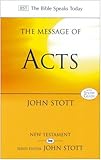
This volume of the Bible Speaks Today series runs to over 400 pages (plus study guide), making it one of the longest in the series. Rather than simply providing commentary on the text, Stott seeks to show how the message of Acts applies to us today.
I have tried, therefore, to address myself with integrity to some of the main questions which the Acts raises for today’s Christians, such as the baptism of the Spirit and charismatic gifts, signs and wonders, the economic sharing of the first Christian community in Jerusalem, church discipline, the diversity of ministries, Christian conversion, racial prejudice, missionary principles, the cost of Christian unity, motives and methods in evangelism, the call to suffer for Christ, church and state, and divine providence.
His attention to contemporary issues raised by the text makes this commentary a much more vibrant read than several other commentaries I have read on Acts (TNTC by Howard Marshall, NICNT by F F Bruce, NIBC by David Williams). Stott does address issues of historicity, geography and historical background, but not to the same depth as these other commentaries, leaving him plenty of space to reflect on theology and practical application.
The group of churches I am part of, newfrontiers, tends to favour different interpretations of the book of Acts to Stott in several places. First of all, Stott is convinced that the concept of an “apostle” belongs to the first century only, arguing that there are no more apostles today, since apostles must be directly appointed by Christ. This causes him to make less emphasis on Paul’s church planting methods and relationship with those churches as a paradigm for modern day church planting and apostolic ministry.
Second, Stott is not a charismatic, and so plays down expectations that gifts of tongues and prophecy as well as signs and wonders may occur today. Third, he strongly disagrees with the Pentecostal (and Catholic) understanding of baptism in the Spirit as distinct from conversion. There are other places where his Anglicanism is noticeable, such as his plea not to abandon the “institutional church”, as well as his views on the mode of baptism.
Notwithstanding these differences of opinion, there is a wealth of profitable material to be gleaned from this commentary. He highlights some interesting parallels between Luke’s gospel and Acts, including the way Paul’s journey to Jerusalem mirrors Jesus’ journey to Jerusalem. In addition, the arrest and trial narratives of both Jesus and Paul have various parallels. Another is the similarity between the Emmaeus road and Ethiopian eunuch stories. By telling these stories in parallel ways, Luke shows how the early believers (and Paul especially) walked in the steps of Jesus.
Just as the Spirit came upon Jesus to equip him for his public ministry, so now the Spirit was to come upon his people to equip them for theirs.
Though he does not take it up at every point, Stott chooses a few key places to defend the historicity of Luke’s account, such as the ascension and the relationship between the three tellings of Paul’s conversion.
Stott brings out plenty of helpful principles for evangelising and for communicating the gospel as he works through the various stories of the mission of the early church, especially in how different approaches were needed for those of different religious and cultural backgrounds.
Although in Acts 19:1-6 Stott is adamant that the Ephesian disciples were clearly not believers, his language sounds remarkably similar to David Pawson’s concept of the “normal Christian birth” consisting of distinct elements:
The norm of Christian experience, then, is a cluster of four things: repentance, faith in Jesus, water baptism and the gift of the Spirit. Though the perceived order may vary a little, the four belong together and are universal in Christian initiation.
Though Stott’s views on the Spirit will not be agreed with by those like myself from newfrontiers, we do find a lot of common ground on his comments on eldership. He sees eldership as being “local” and “plural”, with no pyramid structure, but rather a team. “Elders”, “pastors” and “overseers” are all terms referring to the same office.
This was my second reading of Stott’s commentary on Acts, and it only serves to cement its place as my favourite on this book. I would recommend consulting it to all who preach from or study the book of Acts.


 The Tyndale Commentary series is written to “help the non-technical reader understand his Bible better”. The introduction presents Acts as a “sacred history” – an account of the fulfilmnent of Scripture – and volume 2 in Luke’s story of Christian beginnings. Some emphases he notes include a concern with the opposition that surrounds the spread of the gospel, and Christianity as the true Judaism.
The Tyndale Commentary series is written to “help the non-technical reader understand his Bible better”. The introduction presents Acts as a “sacred history” – an account of the fulfilmnent of Scripture – and volume 2 in Luke’s story of Christian beginnings. Some emphases he notes include a concern with the opposition that surrounds the spread of the gospel, and Christianity as the true Judaism.